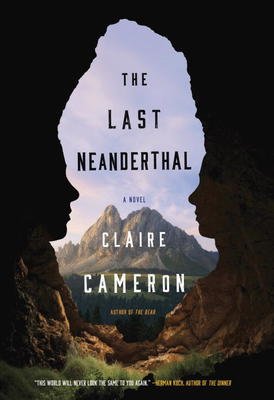
The annual book festival, Wordfest, was very enjoyable here last week. I went to quite a few author talks and readings and picked up a couple signed copies. My favorite talks included one from Canadian author Claire Cameron who spoke about her new novel “The Last Neanderthal,” which follows the story of two female protagonists 40,000 years apart. One character is a Neanderthal girl who’s part of a depleted family, and the other is an archaeologist who unearths her bones in the modern day.
I must say I was impressed by the author’s extensive research and knowledge of Neanderthals for her novel. She said she came up with the idea for the story in 2010 when she read an article about the sequencing of the Neanderthal genome, which showed an incredible overlap of about 99.7 percent between modern humans and Neanderthal DNA. Wow, who knew we were so closely related to this archaic human species, which became extinct around 40,000 years ago. I hope to check out “The Last Neanderthal” sometime in the near future.
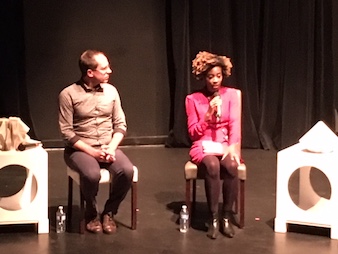
I also enjoyed the talk with nonfiction authors Michael Finkel and Alexis Okeowo, see photo at left. Finkel spoke about his latest book “The Stranger in the Woods: The Extraordinary Story of the Last True Hermit,” which is about a man who lived alone in the woods of Maine for 27 years in a tent. Did he really? My husband is sort of dubious of this, but apparently it is a true story of this man’s sojourn into the wilderness. He was ultimately apprehended after breaking into vacation homes to steal stuff and reintroduced back into society. I’ll be curious to see if the book is as good as Jon Krakauer’s similarly themed 1996 book “Into the Wild” about Chris McCandless who lived by himself for a while in the Alaskan wilderness. That story floored me with its tragic sadness.
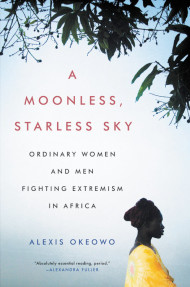
I also met author Alexis Okeowo who writes for The New Yorker and spoke about her debut book “A Moonless, Starless Sky: Ordinary Women and Men Fighting Extremism in Africa.” Okeowo, an American raised in Alabama by Nigerian parents, seems like a talented young star and one to watch. Her book is a result of the five years she spent living in Africa and reporting across the continent.
As Publishers Weekly says of it: “Okeowo’s in-depth, perceptive reporting gives a voice to the extraordinarily courageous—and resilient—women and men fighting malevolent ideologies and organizations in their native countries.” I found the author bright and engaging. So count me in for this one.
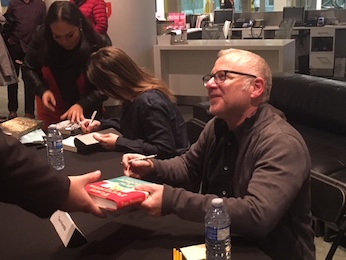
Also at the book festival, I heard novelists Tom Perrotta speak about his latest book “Mrs. Fletcher,” which is about a 46-year-old divorcee whose quiet suburban life becomes upended when her online porn fixations start to spill over into her real life, and Ruth Ware’s latest crime thriller “The Lying Game,” which is set at a boarding school about four friends whose dicey game ends up having dire consequences. I’m not sure either novel is at the top of my list, but I did enjoy hearing them speak about their books and their thinking process in writing them. Both authors were quite impressive, and have various TV/movie options of their books in the works. See the photo of the authors above at left.
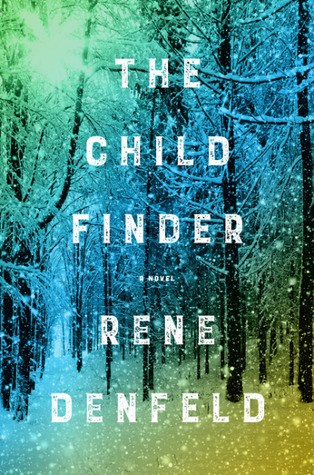
Lastly I’ll leave you with brief reviews of two books I finished last week. First Rene Denfeld’s novel “The Child Finder” is about a private investigator who specializes in missing children and gets on the case of a 5-year-old missing girl who disappeared three years ago while with her parents in a national forest in rural Oregon. Told in alternating chapters by the investigator (Naomi) and the child (Madison), you soon realize that Naomi was once a missing child herself and still has reoccurring nightmares of her days abducted that she’s still trying to figure out; and that Madison is a bright, perceptive child who is doing her best in the predicament she’s in.
It takes a while for Naomi to get any leads on the case as she pokes around the small hamlet in the forest. You wish she’d hurry up, even though it moves almost as well as a snowball downhill to its reckoning. I found the story quite visual and atmospheric, good for suspense. And the author writes about damaged people — like she did with her first novel — quite well.
My only trouble with “The Child Finder” was that I had very high expectations of it because of how much I liked the author’s 2014 debut novel “The Enchanted,” but this one I found pretty typical of other thrillers and missing children stories. I didn’t find the same spark or originality I had with her first book, which wasn’t a thriller, so this one seemed to pale in comparison. Too bad. Sophomore efforts can be hard; sometimes for the author and sometimes for the reader. Still I will continue to see what she writes next.
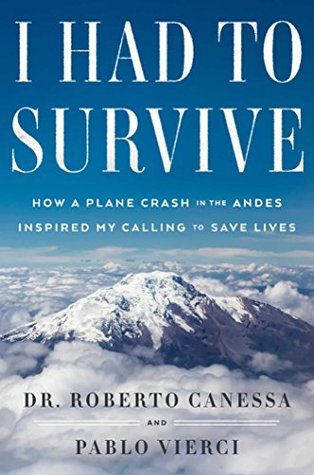
Also I finished the audiobook of Roberto Canessa’s 2016 memoir (written with co-author Pablo Vierci) titled “I Had to Survive: How a Plane Crash in the Andes Inspired My Calling to Save Lives.” Oh my, if you are of a certain age, you probably remember the popular 1974 book “Alive” about the true story of a Uruguayan rugby team whose chartered flight of 45 people crashed into the Andes mountains in October 1972. The survivors spent some 70+ days stranded in the wrecked plane near a mountain peak in sub-zero temperatures and were forced to eat the dead in order to stay alive. Ultimately two of the emaciated players hiked 10 days over the icy peak to get help for the remaining 14. It’s a harrowing and epic survival tale and more deserving than just being known for its cannibalism.
Roberto Canessa, who was 19 at the time and one of the survivors that hiked for help, revisits the story some 40 years later in the book, which is broken into two parts. In the first half, he recounts in vivid detail the horrible plane crash and ordeal on the mountain, as well as the mind-boggling hike out — without proper clothing or gear — to try to find help. It’s quite miraculous he made it that far, considering he had lost 70 pounds and was very weak and withered by the end.
The book’s second half delves into Canessa’s later life as a world-renowned pediatric cardiologist at the Italian Hospital of Montevideo in Uruguay. It recounts his medical cases, saving children with heart defects, which is also pretty amazing, along with his commitment to his patients and always having hope for them no matter how dire their health is.
Quite a bit of the book is told by Canessa, but there are various other chapters that are told by: the flight crews that tried to find them; his father who searched; as well as in the later chapters: the parents of the children he’s treated; and his son and daughter. So you get quite a few different voices telling about his life.
Although the book’s second half gets a bit redundant — involving Canessa’s various medical cases and virtues — taken as a whole his story is quite life-affirming, inspiring, and an example of giving your all when facing adversity and always having hope despite overwhelming odds. The things that Dr. Canessa learned from the plane crash he says have helped to serve his entire life … as a doctor, father and husband. Surely he seems to have never forgotten those desperate days on the mountain and has put his time after surviving it to good use. His is a very admirable story.
What about you — have you read any of these books or authors, and if so what did you think?

Your book festival sounds terrific. I listened to The Stranger in the Woods and didn’t love it the way most people have. I didn’t hate it either. I think I liked The Child Finder more than you did but it’s the first Denfeld book I’ve read.
Thanks Kathy for your opinions on these books! I’m glad you liked The Child Finder, perhaps I was too hard on it. Not sure Finkel’s book will beat “Into the Wild” for me, but we’ll see.
Nothing like a good book festival! I am a little concerned about your feelings on The Child Finder. I too was so impressed by The Enchanted. I will fit that one in somewhere soon. I also want to read The Last Neanderthal.
Hi Judy, maybe The Child Finder will be a fine read if your expectations aren’t too sky high; perhaps I was a bit too hard on it. And anything with Neanderthal in the title has my attention, LOL.
Wordfest sounds like it was a great experience. I love literary festivals and it is way too long since I attended one.
I read Alive a very long time ago. Canessa’s book sounds like a worthy memoir and follow up to that story.
Yeah Brian, Wordfest was great and I enjoy going to it every year. I knew there was someone who would’ve read Alive. It was so popular in the 70s, eh? I’m glad I revisited the incident b/c I had forgotten many of the details that this book goes into. It’s an unbelievable story!
Wordfest sounds wonderful… so exciting to have an opportunity to hear all of those authors speak! I’m also curious about Stranger in the Woods, but probably won’t get to it anytime soon.
Hi JoAnn, Wordfest was great again this year! I wonder if Stranger in the Woods will be as good as people are saying, or just so-so. I will let you know, though I’m not too sure when I will get to it either. I’m giving my signed copy as a gift to my sister. hmm. (she better not read this)
I’m feeling envious of all the fun you had at Wordfest. And all the books you talk about in this post sound great!
“Alive” is one of the first second-hand books I ever bought (probably over 20 years ago now) and I still haven’t read it. Can you believe that? And it’s in really rough shape (I got it for 10 cents) – I keep coming across better copies since but haven’t bought them because now I feel sentimental about the one I have. Ha!
Ha! Naomi – you crack me up. I can relate. My parents house still has an old copy of Alive too. So 1970s. Not sure I ever read the full thing (I was 9 in 1974) but I remember the photos in that book. I’m glad you have kept your copy.
Wordfest is a fun time every year. I always hear from some new authors.
You seem to have enjoyed the literary festival. Lucky you!
Both books you review this week look good. I think I’d prefer I Had to Survive. It sounds like a harrowing story, though the experience was not lost on that doctor.
You’re right Carmen. The doctor’s life really took off despite that terrible crash; he seems to have really learned from it. I think you’d like that book. And the festival was great. Now all done for another year…
It sounds like a fun book festival. I’ve enjoyed Perrotta’s earlier books but haven’t read Mrs. Fletcher yet.
Hi Sarah: Yeah bloggers have posted mixed reviews on the novel Mrs. Fletcher but Perrotta’s talk & reading made it sound entertaining. I liked his novel The Wishbones from long ago, but he changes his direction often I think. thanks for stopping by!
They all sound like fantastic reads, Susan. I am particularly drawn toward ‘A Moonless, Starless Sky’. I am a sucker for moving titles like that. Some call me melodramatic. But there is some magic in words like that. Lately, titles have been failing me. I read a book called ‘Happy People Read and Drink Coffee’, which disappointed me so much that I had to give 1 star for it on Goodreads. I hope ‘A Moonless, Starless Sky’ would stay with me. 🙂
Ha Deepika, you make me laugh. Though titles are important! They seem to be getting more dramatic these days — I agree. The publishers must make these things up to sell books / I have to roll my eyes sometimes over titles. But I am curious about the Africa book so I plan to get to it sometime. When titles are long, or goopy, sometimes I forget them.
The book festival sounds great…and I enjoy Tom Perrotta’s books. I’ve been eyeing The Child Finder…I may have to get it!
Thanks for sharing…and enjoy your week. Thanks for visiting my blog.
Hi Laurel, I’d be interested to hear what you’d think of The Child Finder. I think you would like it. It’s a quick read too. Sometime I’ll get back to a Perrotta book. I really liked his first novel The Wishbones.
The Neanderthal book sounds really good. I like to geek out once in awhile by picking up books like this one. The plane survival book sounds good too. I was pretty young when it actually happened but I know the story well. I would love to learn more about it other than the cannibalistic aspect that is pretty much known by all.
Hi Ti, yeah I was glad to revisit the plane crash tale / which I had forgot all the details about. Quite an amazing story. I would like to geek out too with the Neanderthal novel. I never got to the Jean Auel prehistoric novels so this should be something different.
The Child Finder sounds interesting, as does The Last Neanderthal. I don’t think I’ve ever read a book set in pre-history (well, aside from Magic Treehouse when I was a kid!). I think I included A Moonless, Starless Sky in one of my season book previews but I don’t think I’ll have time to read it.
I know I missed the Jean Auel pre-history novels but this Neanderthal tale looks like one I could get into. The Child Finder is a fast read if you have a slump. I hope to get to a Moonless Sky but who knows where I will go next. Thanks for stopping by Kate.
I have not read any of the books, but I have added The Last Neanderthal and A Moonless, Starless Sky to my list. Both sound quite remarkable.
Thanks TJ — yeah I hope these two books will be good ones! Both authors were quite impressive, and knew their subject matters!
I do remember Alive! I had to Survive sounds really good.
My son is doing a project on prehistoric man for school – I’ll have to tell him about The Last Neanderthal. Of course, he hardly ever reads books I recommend. I’m just his mom – what the heck do I know about books??
Hi Rachel, The Last Neanderthal is a novel so not sure if it will help him or not but it apparently has many of the details right. And glad you recall Alive, it’s hard to forget even if from the 70s! It was a bestseller I’m sure. Thanks for stopping by.
I will definitely look into The Last Neanderthal–I just finished Sapiens, and so have a new appreciation for Neaderthals in general. Fascinating topic and interesting premise for a book.
Hi Jane, thanks. Yeah I think so too. I definitely like prehistoric stuff so this novel caught my interest. I’m on the wait list for it at the library. And I’ve heard Sapiens is good. I’ll stop by to read your review of it soon.